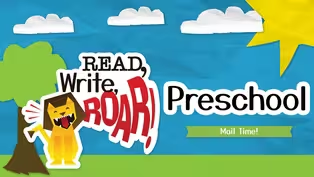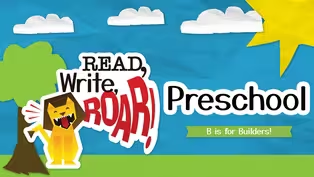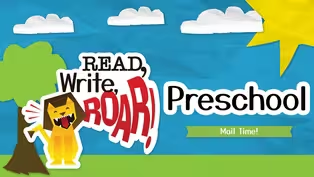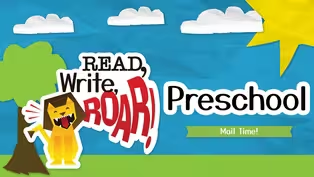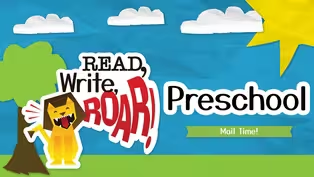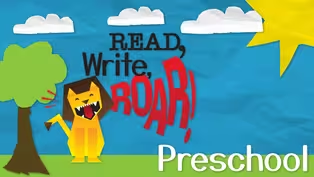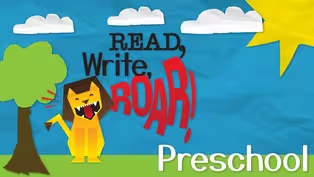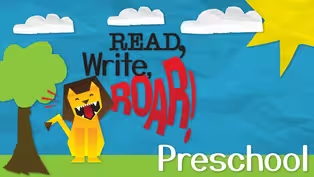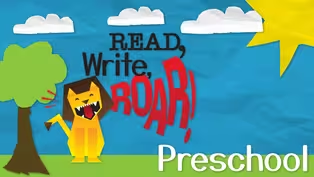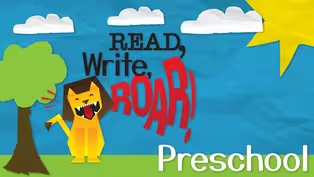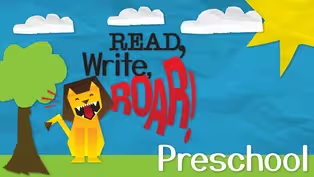Read, Write, ROAR!
Where Is Our Food From?
Season 2 Episode 202 | 13m 19sVideo has Closed Captions
Learn about the people who help feed our community – food and farm workers!
Learn all about Food and Farm Workers, who are very important Community Helpers. Then, try farming for yourself by learning how to plant your own food!
Problems playing video? | Closed Captioning Feedback
Problems playing video? | Closed Captioning Feedback
Read, Write, ROAR! is a local public television program presented by Detroit PBS
Read, Write, ROAR!
Where Is Our Food From?
Season 2 Episode 202 | 13m 19sVideo has Closed Captions
Learn all about Food and Farm Workers, who are very important Community Helpers. Then, try farming for yourself by learning how to plant your own food!
Problems playing video? | Closed Captioning Feedback
How to Watch Read, Write, ROAR!
Read, Write, ROAR! is available to stream on pbs.org and the free PBS App, available on iPhone, Apple TV, Android TV, Android smartphones, Amazon Fire TV, Amazon Fire Tablet, Roku, Samsung Smart TV, and Vizio.
Providing Support for PBS.org
Learn Moreabout PBS online sponsorshipMore from This Collection
Read, Write, ROAR! Preschool is an English Language Arts program for preschool learners. The Michigan Learning Channel partnered with MAISA and real Michigan teachers to create educational video lessons and corresponding activity sheets that align to Michigan teaching standards and the Literacy Essentials.
Video has Closed Captions
Learn all about how to write letters and the community helpers that deliver them! (13m 19s)
Video has Closed Captions
Learn all about builders and construction workers and try building on your own! (13m 19s)
Video has Closed Captions
What does a librarian do? Learn all about these important community helpers! (13m 19s)
Video has Closed Captions
Learn about the people who help keep our bodies health – medical helpers! (13m 19s)
Video has Closed Captions
What's it take to run a restaurant? Learn all about it as we open our own pizzeria! (13m 19s)
Video has Closed Captions
Take a trip outdoors and white about your adventure. (13m 19s)
Video has Closed Captions
Make a fun recipe and listen to a story about gardening. (13m 19s)
Video has Closed Captions
Learn all about the letter /a/, how to write it and what sounds is represents. (13m 19s)
Video has Closed Captions
Practice action, or movement, words as we read the story Over and Under the Pond. (13m 19s)
Providing Support for PBS.org
Learn Moreabout PBS online sponsorship- Food and farm workers are very important community helpers.
On "Read, Write, Roar," we are going to find out all about the people who help grow and harvest our food.
Then, we'll farm for ourselves by planting our own food.
Let's go "Read, Write, Roar."
- [Announcer] This program is made possible in part by the W.K.
Kellogg Foundation, Elaine Stern Foundation, the Max M. and Marjorie S. Fisher Foundation, Donald and Mary Kosch, Lauren and Phillip Fisher, the State of Michigan, and by viewers like you.
Thank you.
(playful music) (lions roars) (playful music) (lion roars) - Hi, children.
Welcome to "Read, Write, Roar."
Can you all do that with me?
- [All] Read, Write, Roar.
- Now let's say it for all the children.
Get ready.
Ready?
- [All] Read, write, roar!
- Yeah.
Now I want you to sing a song with me.
We are going to sing a song about "The Farmer," and I'm gonna show you what the farmer does.
The first thing the farmer does.
So let's sing it with me.
Are you ready to sing this one?
♪ The farmer plows the field ♪ ♪ The farmer plows the field ♪ ♪ Hi-ho the derry-o ♪ ♪ The farmer plows the field ♪ ♪ Now the farmer plants the corn ♪ ♪ The farmer plants the corn ♪ ♪ Hi-ho the derry-o ♪ ♪ The farmer plants the corn ♪ ♪ Now the farmer picks the crops ♪ ♪ The farmer picks the crops ♪ ♪ Hi-ho the derry-o ♪ ♪ The farmer picks the crops ♪ Great job.
(peaceful music) Today, we are going to read part of a story from the book, "Community Helpers: Then and Now."
And this is written by Bobbie Kalman and she wrote the words in this book.
What do you think this book is gonna be about?
Hmm.
- [Children] Doctor.
Community helpers.
- [Teacher] Community helpers.
- [Child] Doctor and fire.
- [Teacher] You think... You see a doctor and a firetruck.
What else do you notice over there?
- [Child] A fire.
A firefighter.
- [Teacher] A firefighter?
- [Child] Firefighter.
- [Teacher] Firefighter.
Well, we're actually gonna read the page.
It says, "Food and farm workers.
"Next to air and water, food is the most important thing "we need to stay alive.
"Agricultural workers, or farmers, "grow the food we eat.
"The farms send some of the food to factories "where it can be made into different kinds of foods.
"The foods are then sold in supermarkets.
"Many people get food from farms to our tables.
"Who are these helpers?
"ú And look, they have some text underneath the pictures that give us some more information.
This picture says, "Farmers grow the foods we eat, such as corn."
"Workers in factories prepare "and package food such as bread."
I had some bread this morning as part of my breakfast.
"Drivers deliver the food to stores where we buy it."
And then, "supermarket workers keep the foods fresh "for us to take home."
What's something that you get from the supermarket?
- I get carrots, vegetables, and I don't know what else.
- You don't know what else.
What do you get if you go to the supermarket?
- Well, I never went to a supermarket.
Just kind of like stores.
- Just stores?
Well, what would you get if you had to get something to eat?
- From the store, you mean?
- [Teacher] Mm hmm.
- Mama says always I have to get vegetables with milk.
- Yeah, your mom says you have to get milk and vegetables.
It looks like that's what this person is doing too.
He's got milk and vegetables in his cart.
Layla, what would you get?
- I thought of some tomatoes.
- [Teacher] Oh, tomatoes.
- I never.
- Vegetables.
- Me, I hate tomatoes.
- [Teacher] You hate tomatoes?
Oh, I thought I had a special surprise but I'll have to save that for later.
- My favorite kind of treat is cupcakes.
- Oh, cupcakes are a favorite kind of treat.
We could get cupcakes from the grocery store.
It's not something that's grown directly from the farm but it's something that's produced in the factories.
Let's see about this one.
This is "Farming long ago.
"In the past, most people got their food "from gardens they planted next to their homes.
"People also raised chickens, pigs, "and one or two horses and cows.
"Some farmers had large fields "where they grew corn or wheat.
"Farm helpers were often family members "like the children above collecting pumpkins."
So the children of the farmers did some of the work.
They're the ones collecting or picking up the pumpkins.
'cause this one says, "Are you a helper?"
- My mom never give me things to get help.
- Oh, your mom doesn't give you things to help?
- [Teacher] You help.
What do you do?
- I wash the dishes.
- [Teacher] You wash the dishes.
That is a great help.
- Sometimes I cook with my mom.
- Oh, you cook with your mom?
That's being a helper.
- I do always cook with my mother.
- You always cook with your mother?
- Not always.
- Sometimes she, she says no.
- I help my mom making my bed.
- You help making your bed.
- Some days my mom says no.
- Sometimes she says no.
- Yeah, sometimes people like to do things independently or by themselves, and sometimes they wanna have helpers.
So it sounds like you are a helper sometimes.
Let's read this part and see what else they say 'cause it sounds like one of the things I read is something that you get to do.
"Do you have a garden at your home?"
Do you have a garden?
- My mom is trying to plant a garden.
- She's trying to plant a garden.
Oh.
- Me too.
- [Teacher] You too?
- I really want flowers to grow in my backyard.
- Oh, it sounds like it might be a process.
You're trying to get them but it didn't quite work the first time.
All right, great job.
(peaceful music) Remember earlier we read this book about farmers and how they grow food?
- [Children] Yeah!
- Now, you get to be a farmer and we're gonna follow these step-by-step instructions and plant some seeds.
Let's find out what we have to do first.
What does it say to do first?
What do you think we have to do?
- We have to go and put the dirt in the cup and dig the seed.
- Yep, so the first step, you're right.
It says, "Put some dirt inside your pot, "but make sure it doesn't overflow."
So here.
- What does overflow mean?
- Overflow would mean that it would come out of the top and then go onto the table.
So you wanna fill it up.
- Yeah, if you just like... like this.
- Yep, with just enough space.
- Like it's full like a volcano.
- [Teacher] Like a volcano, look like it's erupting.
So we'll start with Layla.
Layla, go ahead and scoop in your dirt.
I wonder how many scoops it will take to fill it up.
Let's count.
That's one.
- Maybe just... No, that was one.
- [Teacher] Okay.
Two.
Three.
You're being very careful not to spill.
Four.
Five - Five.
- Do you want more or you're good with five?
All right, let's move this.
And let's read step two.
It says put your finger.
So poke a finger, "Poke a hole with your finger "and then stop right at your knuckle."
Your knuckle is the part of your finger that bends.
So go ahead and, yep, stick your finger all the way in there.
And then step three, you gotta open up a... - [Child] My knuckle.
I did it.
- [Teacher] You did it up to your knuckle?
- I did it too.
- Yep, and then we're gonna put your seeds in.
- And then right in the hole that we did?
- Yep, in the hole.
So... - And now dig it.
- I did it.
- [Teacher] And then you're gonna put your seeds.
- [Child] I did it.
- [Teacher] You dropped your seeds in?
- [Child] I dropped my seeds in there.
- Let's get some more.
- Get some more.
You can put all of them in there.
- Yeah, all of them?
- That's weird.
- You put them all in.
Okay, now let's see what it says.
Now you have to "move the dirt back to the top."
Oh, you have two more.
All right.
And then once you do that, cover it up.
- Cover this way?
- Yep.
Cover it with your hands.
- Is it gonna plant for real?
- It is, because now what did we say that plants needed?
- [Child] Spray.
- Yeah, we have to put some water in it.
I don't have a spray bottle, but I do have a watering can.
So, all right.
- Then you, is it filled up with water?
- It is.
It's not full to the top 'cause I didn't want it to spill, but it has enough water in it for everybody to water their plant.
All right, now pass it to Brent.
- It's green, my favorite color.
- [Teacher] You and I have the same favorite color.
Mine is green too.
- Yellow.
You get a rainbow.
- [Teacher] You have a rainbow?
All right.
These sparkles.
Now, what do you think's gonna happen, now that we put seeds in?
- It'll grow.
- It'll grow.
- And then we wait.
- And then we wait.
And that's what it says.
- You're gonna mail it.
- But it's gonna need something else.
We have dirt.
We have water.
What else do plants need to grow?
- Sun!
- Sun, so we're gonna have to put these by the window and let it have some sun.
Thank you for all being farmers with me today.
I can't wait to see your seeds sprout.
(gentle music) While reading aloud to children, make sure to practice the new vocabulary.
Explain the meaning of new words and terms by using child-friendly language.
It also increases children's connections to the words and terms by having them say the words out loud.
Ask questions about the new vocabulary or create a new action that helps reinforce meaning.
Going over new words and terms in a variety of ways allows children to interact with them more and to become more comfortable with using and understanding these new vocabulary words.
As you continue reading, be sure to review any captions under pictures.
It is important to not skip over them or other text features, since they often contain critical information to help build meaning.
Following written step-by-step directions is a great way to promote literacy in everyday activities.
It connects texts to actions and also provides an opportunity for extended back-and-forth conversations with your child that includes questions that aren't answered with a simple yes or no.
Planting seeds is a fun step-by-step activity.
Find a set of good seed-planting directions in a book from the library, on the back of a seed packet, or even online.
Read the directions out loud and perform each step as directed.
How else could planting seeds promote literacy?
Could your child make labels for different types of seeds grown?
What about writing observations in a daily journal, or even making a prediction about when the seeds will sprout and writing that down?
The possibilities are endless.
(peaceful music) What a great time we had today!
We talked about farmers and food service workers.
Tell me something you remember about what they do.
- I know that they've been growing pumpkins and I know that they've been buying fruit.
- And I know about they've been servicing it at a store called a store.
- A store.
- And also they serve it for people that need the food and they need it to eat.
- You're right.
Layla, what do you remember?
- He, the man was trying to get the grass short and not long.
- You're right.
He wanted it short and not long.
So part of what they were doing was they were harvesting or picking the crops.
And we know that they work really hard.
So next time you see somebody that's farming or somebody that's in the grocery store or a supermarket we should say thank you because they work really hard at their job.
Now, let's go back to our song.
This time we get to act it out but we'll stay in our seats to do it.
So remember it was called "The Farmer."
And the farmer plows the field.
How can we make him plow?
Yep.
Let's do it.
♪ The farmer plows the field ♪ ♪ The farmer plows the field ♪ ♪ Hi-Ho the derry-o ♪ ♪ The farmer plows the field ♪ Now, he plants the corn.
♪ The farmer plants the corn ♪ ♪ Hi-Ho the derry-o ♪ ♪ The farmer plants the corn ♪ Now we pick the crops.
♪ The farmer picks the crops ♪ ♪ The farmer picks the crops ♪ ♪ Hi-Ho the derry-o ♪ ♪ The farmer picks the crops ♪ See you next time.
- Bye!
- Ready?
On... - [All] "Read, Write, Roar!"
- [Announcer] This program is made possible in part by the W.K.
Kellogg Foundation, Elaine Stern Foundation the Max M. and Marjorie S. Fisher Foundation Donald and Mary Kosch, Lauren and Phillip Fisher, the State of Michigan and by viewers like you.
Thank you.
(upbeat music) (piano logo music)


- Home and How To

Hit the road in a classic car for a tour through Great Britain with two antiques experts.












Support for PBS provided by:
Read, Write, ROAR! is a local public television program presented by Detroit PBS
